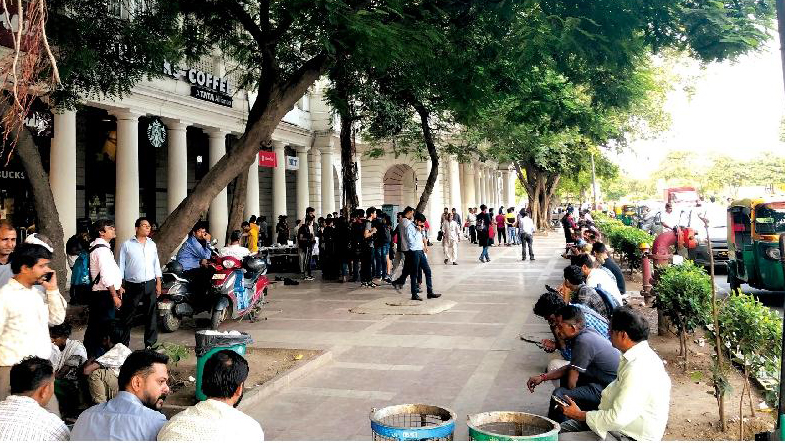However, the speed of downloads and uploads varied during the day and night and the difference was stark. At noon, the MTNL wi-fi at CP gave a download speed of 31.6 Mbps while the upload speed remained at 13.7 Mbps. At night, the download speed plunged to 6.88 Mbps and the upload speed to 12.3 Mbps. The Signpost wi-fi was functioning swifter: streaming of videos and social media apps was quicker and more feasible as its speed hovered around 11Mbps during the night time.
Even if it were available, however, free wi-fi is not necessarily a good thing. Rakshit Tandon, Cyber Security Consultant- Internet and Mobile Association of India, told Patriot, “One has to be cautious while connecting to a free public wi-fi.” The biggest concern, Tandon said, “is most of the public wi-fi are unencrypted. That means whatever you do on the network, and whatever sites you visit, anyone can see and monitor those activities. Another danger is that a hacker can place an access point between the user and the public wi-fi connection, which can be used to steal sensitive information like credit cards number, passwords, etc.”
Detailing other threats, Tandon who is also the Director, Council of Information Security (CIS), says “Another threat can be injection of malware to your device via public network if your file sharing is enabled. In that case, malware can steal personal data from devices and redirect to hackers. Fake hotspots can also happen when a hacker sets up a hotspot in a public area with a fake name which resembles the real one like `Free Wifi_ Airport’ and trap innocent people to spy on their internet activity.”
The cyber expert gives a few tips to mitigate the risk of hackers targeting the devices. “Use a Virtual Private Network (VPN) which routes all your data through another server to help increase online security and privacy. Always use SSL Connection (HTTPS), the Secure Sockets Layer is a security protocol that encrypts data through the site you’re accessing. Keep wi-fi off on the device if not in use. Use public wi-fi for entertainment, news and watching videos — be careful with social media and emails.”
Unaware of these perils, Suraj, another vendor at the Connaught Place says, “Earlier people did use wi-fi. Excitement was seen when the NDMC first installed it one and a half years ago but as time went by, the speed and connectivity both backfired and most of the users lost interest in the free service.”
As of now, he says, “It’s tough connecting the NDMC’s wi-fi. If one gets lucky, then there is high possibility that it won’t work and a message will appear saying `Internet may not be available’ but it’s the Docomo wi-fi which gets connected only for 10 minutes and thereafter the premium version is required. These wi-fi services now serve emergency purposes only.” The premium wi-fi provided by the NDMC at CP costs Rs 100 for 15 GB, Rs 50 for 6 GB and Rs 10 for 1 GB. Yet most users across Connaught Place prefer using up their own mobile data rather than using NDMC’s wi-fi.
At the busy Rajiv Chowk Metro station, commuters cited `lack of time’ as a reason for not using the DMRC’s wi-fi. An exception to this rule was Deepali Srivastava, a journalist with Inshorts. She said that she is aware about the free wi-fi scheme of the DMRC and connects it whenever she gets time but more often than not, she doesn’t use.
“It does connect for a very few minutes and the speed is also slow. I always hope that maybe today the speed would be good but that is never the case; if they (DMRC) have to provide slow wi-fi, then it should not be given at all.”
Deepali raises a flag over the slow speed, saying “If a person doesn’t have his/her mobile data and needs to connect to the free wi-fi at Rajiv Chowk in order to search routes or anything else in emergency, then these free wi-fi hotspots are no use.”
The download speed of the free wi-fi being provided at the Rajiv Chowk Metro station was 9.64 Mbps while upload speed was 9.77 Mbps — yet sending a WhatsApp text was tough.
At Khan Market, the scene is different as the free wi-fi does not even connect, let alone allowing anyone to use it. Most shoppers use 4G mobile data being provided by Reliance Jio, Airtel or Vodafone- Idea and even shop owners avoid using it. A momo vendor says “Connecting to free wi-fi is quite a headache.” In this situation, checking out the speed was out of the question.
When Patriot reached out to the president of Khan Market Traders Association, Sanjiv Mehra, he said that all this free wi-fi thing is a”gimmick and a trick to fool everyone.” “NDMC facilitated Vodafone 5-6 years ago in Khan Market to provide free space to the telecom company as it offered free wi-fi to the public. It doesn’t work properly even for paying customers, so how can we expect it to work for free? This free wi-fi thing is a fraud, they just swindle the money,” says Mehra.
Detailing his reservations over the freebies, Mehra says, “I am never in the favour of anything which comes for free, whether its water, electricity or wi-fi because we don’t respect those things. My take is that let the companies charge for the wi-fi but at least provide better facilities.” “Earlier Vodafone gave us cards to avail the free wi-fi facility at the market but the idea failed very soon as no one would wander around shops looking for cards to get 20 minutes of free wi-fi; so these are all gimmicks by the companies to attract customers and sell their broadband connections. These are their tricks,” concludes Mehra.

